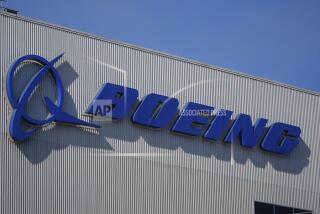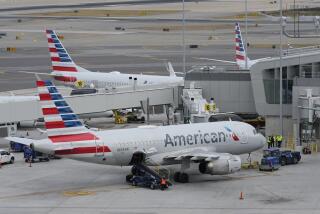Pan Am Cutting Jobs; Northwest Increasing Fares : Airlines: The war-induced travel slump forces Pan Am to eliminate 4,000 jobs and reduce service to Europe. Northwest blames its fare hike on increased fuel and security costs.
- Share via
Pan Am Corp. said it will cut an additional 4,000 jobs and Northwest Airlines announced a fare hike in separate responses Tuesday to the worsening slump affecting the travel industry since the Persian Gulf War began.
Pan Am also said it is trimming transatlantic service by about one-third after suffering a steep 29% plunge in European travel during January.
The airline industry is taking a financial beating due to a sharp drop in travel and spiraling costs. Record losses have forced the airlines to lay off thousands of employees and cancel near-empty flights, especially to Europe. The financial turmoil has forced two airlines, including Pan Am, to seek bankruptcy protection. A third carrier, Eastern Airlines, has closed for good.
The reductions at Pan Am signify that the New York-based carrier is continuing to shrink as it reorganizes under bankruptcy court protection. Together with 2,000 jobs eliminated last fall, Pan Am has reduced its work force by 21% from a year ago.
Pan Am said some of the job reductions will involve transfers to United Airlines if it completes the $290-million sale of its prize London routes. The sale is pending an agreement between the United States and Great Britain on the transfer of landing rights at London’s Heathrow airport.
The job cuts will also involve an as yet unspecified number of layoffs, most of them at Pan Am’s main subsidiary, Pan American World Airways. Pan Am also operates a shuttle service in the heavily traveled Boston-New York-Washington corridor.
“The precipitous decline in demand for transatlantic travel requires painful action,” Pan Am Chairman Thomas G. Plaskett said in a statement.
“We cannot absorb revenue loss without taking severe steps to lower our costs commensurate with the reduced revenue,” he said.
Pan Am spokesman Jeffrey Kriendler said the airline’s European bookings are down 20% to 50% from last year, with the largest reductions in travel to Rome and London and lesser declines in Eastern Europe and Scandinavia.
He said Pan Am was not eliminating any destinations in Europe but would reduce the number of flights and use smaller airliners. Pan Am has replaced 412-seat Boeing 747s with 192-seat A310s on most European destinations, he said.
Pan Am is the second major U. S. carrier to severely slash overseas service because of the effects of the war. Trans World Airlines last month fired 3,000 employees and cut out one-third of its European flights because the recession and fears of terrorist attack kept travelers on the ground.
Meanwhile, Northwest said it planned to temporarily raise fares on Friday with a $7.50 surcharge on one-way tickets to cover the increased fuel and security costs. The round-trip surcharge is $15.
The industry has raised fares by 15% since Iraqi’s Aug. 2 invasion of Kuwait, mostly to cover fuel costs that rose to more than $1.40 a gallon in October from 60 cents.
Though fuel costs have declined to around 70 cents a gallon, a Northwest spokesman said the airline is paying more for security since the war started. In addition, Northwest said last fall’s fare hikes have been eroded by fare wars and other promotions.
The Air Transport Assn., the industry lobby, has estimated that industrywide security expenses will double to $1 billion this year if the war lasts through December. Northwest would not disclose its security bill, but a spokesman said: “All you have to do is go to the airport and see the additional security guards to understand there is a cost involved.”
Industry analysts said it was doubtful other airlines would boost fares, raising the possibility that Northwest might be forced to rescind the surcharge. Northwest acknowledged that it might withdraw the surcharge if the rest of the industry didn’t go along.
“I have to guess that with traffic softening they (Northwest) are going to have trouble making it stick,” said Paul H. Nisbet, an airline industry analyst with Prudential-Bache Securities in New York.
Nisbet said it was likely that Northwest’s chief transpacific competitor, United Airlines, would keep fares low to lure Northwest customers. United refused comment on the surcharge Tuesday.
Northwest also said Tuesday that it chopped its European service by 17%, and American said that on March 2 it is reducing its European flights by 40% because travel is down drastically. American said it has dropped plans to begin service to Rome this spring.
In other developments, British Airways said Tuesday that it is suspending Concorde service to Washington and reducing its daily Concorde round-trip flights between London and New York to one from two.
More to Read
Inside the business of entertainment
The Wide Shot brings you news, analysis and insights on everything from streaming wars to production — and what it all means for the future.
You may occasionally receive promotional content from the Los Angeles Times.










